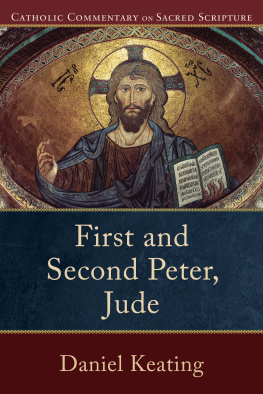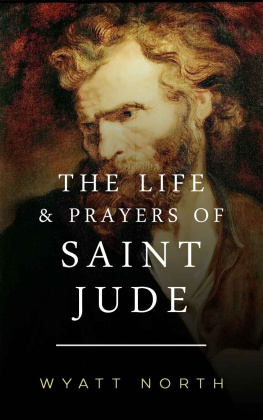Anonymous - St. Jude Thaddeus: Helper in Desperate Cases
Here you can read online Anonymous - St. Jude Thaddeus: Helper in Desperate Cases full text of the book (entire story) in english for free. Download pdf and epub, get meaning, cover and reviews about this ebook. year: 2015, publisher: TAN Books, genre: Religion. Description of the work, (preface) as well as reviews are available. Best literature library LitArk.com created for fans of good reading and offers a wide selection of genres:
Romance novel
Science fiction
Adventure
Detective
Science
History
Home and family
Prose
Art
Politics
Computer
Non-fiction
Religion
Business
Children
Humor
Choose a favorite category and find really read worthwhile books. Enjoy immersion in the world of imagination, feel the emotions of the characters or learn something new for yourself, make an fascinating discovery.

St. Jude Thaddeus: Helper in Desperate Cases: summary, description and annotation
We offer to read an annotation, description, summary or preface (depends on what the author of the book "St. Jude Thaddeus: Helper in Desperate Cases" wrote himself). If you haven't found the necessary information about the book — write in the comments, we will try to find it.
St. Jude Thaddeus: Helper in Desperate Cases — read online for free the complete book (whole text) full work
Below is the text of the book, divided by pages. System saving the place of the last page read, allows you to conveniently read the book "St. Jude Thaddeus: Helper in Desperate Cases" online for free, without having to search again every time where you left off. Put a bookmark, and you can go to the page where you finished reading at any time.
Font size:
Interval:
Bookmark:
St. Jude Thaddeus
Helper in Desperate Cases
| Nihil Obstat: | William W. Baum, S.T.D. Censor |
| Imprimatur: | Charles H. Helmsing Bishop of Kansas City-St. Joseph November 27, 1963 |
Originally published by the Benedictine Convent of Perpetual Adoration, Clyde, Missouri. 44th edition issued in 1970.
Retypeset and republished in 1999 by TAN Books and Publishers, with addition (substitution) of the Douay-Rheims version of the Epistle of St. Jude and of the traditional Roman Missal text for the Mass of St. Jude, and the addition of the Douay-Rheims notes to St. Judes Epistle and of excerpts from The Golden Legend.
ISBN: 978-0-89555-648-6
Library of Congress Catalog Card No.: 99-70786
TAN Books
Charlotte, North Carolina
www.TANBooks.com
2012
But you, my beloved, building yourselves upon your most holy faith, praying in the Holy Ghost, keep yourselves in the love of God, waiting for the mercy of our Lord Jesus Christ, unto life everlasting.
Jude 1:20-21

St. Jude heals the afflicted King of Edessa.
Then calling together the twelve apostles, he gave them power and authority over all devils, and to cure diseases. And he sent them to preach the kingdom of God, and to heal the sick.
Luke 9:1-2
Contents

St. Jude, Pray for us.
And he sent them two and two before his face into every city and place whither he himself was to come. And he said to them: The harvest indeed is great, but the labourers are few. Pray ye therefore the Lord of the harvest, that he send labourers into his harvest.
Luke 10:1-2
Saint Jude
Helper in Great Need
Early Life
Devotion to the holy Apostles should be cherished because they were the first teachers of our Faith. During the Middle Ages the Apostles were held in high veneration, but in our materialistic age, this devotion has greatly declined, though veneration of St. Jude Thaddeus has been revived in recent years.
St. Jude is called the Patron of Hopeless and Desperate Cases, owing to the singular help he has obtained for his clients in grave necessities.
This holy Apostle bears the surname Thaddeus (meaning amiable or loving), which distinguishes him from Judas Iscariot, the traitor. Besides the Apostle James the Less, Jude had two other brothers who, together with himself, are called the brethren of Jesus, which in Hebrew signifies a near relationship. His father was Cleophas, who was probably a brother of St. Joseph. Because of his fearless confession of the Resurrection of Christ, Cleophas was put to death by the Jews and thus won the crown of martyrdom. The mother of our Apostle was Mary of Cleophas, possibly a cousin of the Blessed Virgin, who with Mary stood by the Cross of Jesus on Calvary.
In his boyhood, Jude and his brothers must have been close companions of Jesus. No mention is made of Judes occupation before his call to the apostolate, but we may judge that he was a farmer, since he belonged to the tribe of Juda, which was devoted to farming.
From the time Jude was chosen to be an Apostle, he labored with untiring zeal, particularly for the conversion of the Gentiles.
Cure of the King of Edessa
St. Jude is usually represented wearing a picture of Our Lord on his breast. This custom stems from the following legend:
Abgar, King of Edessa (the modern-day city of Urfa in Turkey), who was afflicted with leprosy, hearing of Our Lords miracles, sent a messenger begging Jesus to come and cure him. Being unable, at the time, to gratify his request, Our Lord sent word that He would send someone later to cure him. The King, anxious at least to have an image of the great wonder-worker, sent an artist to make a portrait of Him: but the artist, blinded by the splendor of our Saviours face, was unable to carry out his mission. At this, Our Lord, in loving compassion, pressed a cloth to His face and impressed His features upon it. The artist then carried this to his sovereign, who received it with great joy.
When St. Jude went to Edessa after Our Lords Ascension, he healed Abgar of the frightful disease and, by his eloquent presentation of the truths of the Gospel, converted the King and his whole household, as well as many of his subjects.
Conversion of Barbarians
After firmly establishing the Church in Edessa, St. Jude visited the whole of Mesopotamia, preaching the Gospel and everywhere increasing the number of the faithful. Having returned to Jerusalem for the council of the Apostles, he afterward joined St. Simon in Libya, where the two Apostles spread the light of the Gospel. Then they set out for Persia, where God gave them an abundant harvest. It is impossible to compute the number converted or to describe the change in the manners and customs of that savage people.
Before the arrival of the two Apostles, the laws and habits of the Persians were unjust and wicked. The marriage tie was totally disregarded; the dead were thrown into the fields to become the food of wild beasts; and other barbarities prevailed. Taught by the Apostles the noble and generous sentiments of the True Religion, these people soon became the admiration of other Christians. Barbarity was replaced by gentleness, cruelty by Christian charity, impiety by evangelical perfection.
Victory over the Persian Magicians
In Persia, the two Apostles were continually thwarted in their work by two magicians named Zaroes and Arfaxat. By their art and incantations, these magicians tried to uphold the worship of idols. At every step they confronted the Apostles and denounced them as impostors, but the two Saints invariably exposed their tricks and impostures. In the presence of the two holy Apostles, the idols refused to answer their false priests. When the Apostles, in the name of God, commanded the idols to speak, they were forced to acknowledge the Saints as the disciples of the true God. The Saints ordered the demons inhabiting the idols to quit them, which they did, howling with rage and shattering the images.
The two Apostles set out for the camp of Baradach, commander-in-chief of the Persian army, where they were met by the same magicians, Zaroes and Arfaxat. The Persians were then preparing to march against an army from India, and Baradach was anxious to know what the outcome of the war would be. We know you are more powerful than our gods, he said to the Apostles, for at your approach the idols fell to the ground. After the war is over, we will gladly listen to your teaching. Tell us what the result of this war will be.
The Apostles commanded the demons to answer. Questioned by their priests, the idols replied that the war would be long and many would perish.
Fear not, O Prince, your gods lie! joyfully exclaimed the two Apostles. Tomorrow, at this same hour, ambassadors will arrive from your enemy to conclude negotiations for peace.
On the following day the ambassadors from India arrived at the hour designated by the two Saints, and terms of peace were agreed upon. The Prince, indignant at the false prophecies of the wicked magicians, ordered them to be burned alive, and likewise all who maligned the holy Apostles. But Simon and Jude interceded with the commander, and the punishment was averted.
Filled with admiration for the two Apostles, Prince Baradach conducted them to the King of Persia. Here also they performed miracles to frustrate the wicked designs of the same magicians, who had preceded them there.
Next pageFont size:
Interval:
Bookmark:
Similar books «St. Jude Thaddeus: Helper in Desperate Cases»
Look at similar books to St. Jude Thaddeus: Helper in Desperate Cases. We have selected literature similar in name and meaning in the hope of providing readers with more options to find new, interesting, not yet read works.
Discussion, reviews of the book St. Jude Thaddeus: Helper in Desperate Cases and just readers' own opinions. Leave your comments, write what you think about the work, its meaning or the main characters. Specify what exactly you liked and what you didn't like, and why you think so.
















